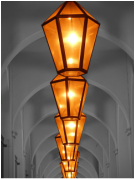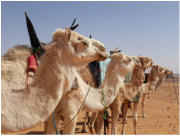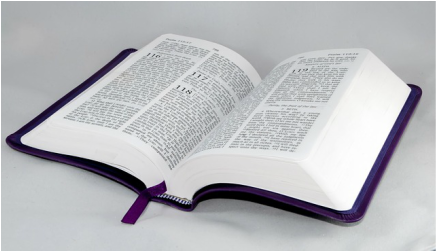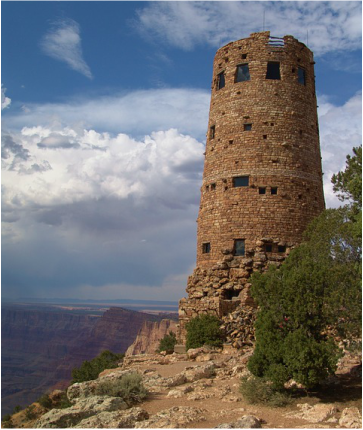|
Isaiah continues proclaiming burdens this time against Babylon, Dumah, and Arabia. Isaiah Chapter 21 Lessons from the text Watchmen Nowadays, we have satellites, security cameras, and scouts. In Isaiah’s days, they had watchmen. A watchman was a guard of a watchtower. Usually located on the boarders of a country, they would sound the alarm for invasions or other troubles. There were also watchmen near the king to act as messengers for any event occurring in the nation. Spiritually, a watchman is a man of God (Ez 3:17, 33:7, Isa 62:6). Having the Spirit of Truth in them, they see what is happening to the world and with God’s wisdom can foresee troubles and destruction. As Jesus said, the blind cannot lead the blind (Mt 15:14). People in sin cannot recognize that their behavior is self-destructive; neither can they recognize that they may be incurring God’s judgment. The watchman, as a man of God, is to warn people of the consequences of their actions and try to turn people back to God. They are also the sounding board for God, proclaiming God’s decrees. Before Christ, the prophets were God’s watchman. Now that responsibility falls mainly on preachers, but every born-again believer has the responsibility to share the Gospel. No, we are not all to cry aloud from a pulpit, but we are to be a witness to the truth: namely, that God is righteous, man is sinful, and God will one day destroy this world for its sins so He can remake it without sin. In my daily life, I see that “Christians” are not concerned about sharing the Gospel. After all, that’s the preacher’s job on Sunday. Their job is merely to attend church. In Ezekiel, God says that if we do not warn our brothers about the consequences to their sins, then He will hold us responsible as if we had committed the sin (3:17-21). When we truly love our brother, we want him to live and come to a saving knowledge of Christ. It is natural for us to try to speak to him in love and caring about his soul’s state. If this care is missing, then something is wrong in our hearts. Please take the time to ask God how He wants you to be a light and watchman to the world.
Verse by Verse Commentary 1 In a swift, mighty wind, the people of Elam and Media will come to spoil Babylon. Their land is described as "terrible," "treacherous," and spoiling others. 2-4 This vision is not pleasant to Isaiah. Seeing overwhelming evil, he is grieved and dismayed to the point of losing sight of his joy. Like with the king of Assyria in chapter 10, Elam and Media are given a charge from God to perform His will; God has strengthened them to do His bidding, but Isaiah's reactions informs us that instead of performing His will with righteous intent, Elam and Media arise to plunder and mistreat Babylon. 5 In response to seeing this evil, Isaiah commands the princes to take sustenance, set a watch, and anoint the shields in preparation for battle. 6 Switching from Isaiah's words to God's words, the remaining verses of this chapter describe the vision which Isaiah saw. The first two visions center around a watchman. This watchman served two purposes:
 God called Ezekiel his watchman and charged him to proclaim warnings to the wicked (3:17). In light of this fact, this watchman could very easily be Isaiah himself. 7 The chariot, horse, donkey, and camel all represent different parts of a rich society; a chariot and horse for military might, a donkey for prestige (Jd 12:14), and a camel for material goods. Seeing this company, the watchman pays special attention to what they say. 8 With a voice as mighty and bold as a lion, the watchman proclaims to the ruler what he saw. This watchman is doing exactly what he is supposed to be doing: keeping watch day and night. One honors God and reaches one's greatest usefulness to Him and one's fellow man when one performs the duty for which one is made. 9 The company of men, horses, donkeys, and camels are crying out the news of Babylon's fall. Most likely, they are escapees of the event, as they are not the typical messenger. Tied in with Babylon's destruction is the judgment of her idols. In Scripture, Babylon represents the glory of the world, the system which cultivates sin and all manner of ungodliness (Rev 17:1-6). 10 The watchman is concerned for his people for they are the fruit of his labor. He has proven himself to be a faithful messenger of God. As the watchman is not given a specific nationality, each person can relate to this passage as a message to their own nation: Babylon has fallen! God has destroyed the idols of the world, implying, of course, that God is superior to all the glory and riches of Babylon. No matter how tempting this world may be, it will fade away. The only glory and riches that will endure are found in God. 11 This time, instead of the watchman going forth, a call is made to the watchman. This person is desperate to know if there is any ill-tidings, as is revealed by the repetition of the question. Mount Seir is located in what was at that time Judah. The Israelites, then, are the ones who are desperate to know what is the word from God. As God's people, we should be hungry to hear from Him. 12 In response to the inquiry, the watchman says that the light is coming but also darkness will come. There will be a time of great light and success for Dumah, but also a time of darkness. This could be interpreted as referring to the coming of Christ; His appearance was a great light, but their rejection of Him left Judah in the darkness and was soon crushed under the Roman Empire. The watchman invites the questioner to inquire of God. He invites him to return and come back to where he is. Since the watchman is the faithful messenger of God, this return means coming back to fellowship and obedience to God. 13 Dedan was the son of Raamah, son of Cush, son of Ham, son of Noah (Genesis 10:7). Ezekiel describes the city of Dedan as the merchants arrayed in gold and jewelry (27:20). The traveling merchants, therefore, will lodge in the forests of Arabia. 14-17 Tema was one of the sons of Ishmael. These people will show kindness to the refugees of war. Kedar was also a son of Ishmael. God revealed to Jeremiah that Kedar would be one of the cities which would be destroyed by Nebuchadnezzar king of Babylon (49:28). In that battle, the Arabian army will suffer great loss. To conclude the vision, God reminds the reader that He is the one directing the course of human history. ___________________ Please comment below to tell us what you learned from today's lesson.
0 Comments
Leave a Reply. |
Devotional Categories
All
Archives
September 2023
|
|
Join my mailing list!
|
Thank you!You have successfully joined our subscriber list. |
|
© 2024 Melissa Beaty
|

